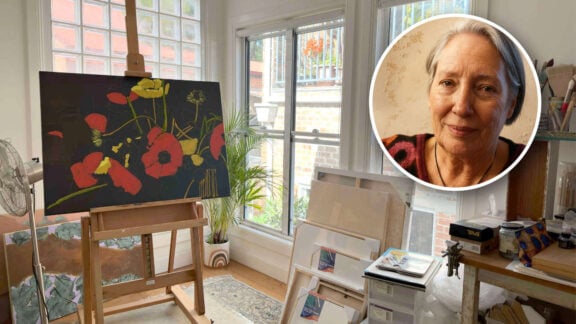Ikebana, the Japanese art of flower arrangement, is like many Japanese traditions, premised aesthetic and philosophical balance, simplicity and discipline.
The tradition began in Kyoto some 500 years ago and one of its most inspired local practitioners is Evan Demas.
Simplicity and silence are necessary during practices of Ikebana. It is a time to realise things in nature that people often overlook.
“It has an aesthetic and philosophical dimension,” says Evan Demas, to Neos Kosmos English Edition (NKEE) . “Ikebana is aesthetic and philosophical. It is about the universal consciousness redirected into the individual.”
Demas’ weave of tall grasses rising through a weather beaten wooden table, or entangled within metal mesh sheets, reminds one of the relics of the past – overgrown and moving in concert with nature.
Demas traces back his love affair with Japanese aesthetics and philosophy, “It all began about 12 years ago, due to my brother who had a book about Aikido, which was all about capturing and re-directing energy, in human movement.
It was presented so simply yet had an underlying complexity and depth. I did not know at that time what it was, but I recognised its importance.”
The viewer is intrigued by the way plant material, metal and wood, give way to natural change. The plants will grow and rot, the wood ware down and the iron must rust.
Demas says to NKEE, “It is the Japanese concept of wabi sabi, which is about processes, natural ones, wind, time, weather, rust and decay. It allows meditation not only on the craftsmanship but how the universe works.”
Demas’ work demands serious attention for his contemporary approach to Ikebana and he has received it.
He has been was awarded the prestigious Norman and Mary Sparnon Endowment to study in Japan and has taken numerous Melbourne International flower and Garden Show prizes as well as presenting a major bamboo installation at the National Gallery of Victoria.
As a Hellene, he sees a subtle relation between Japanese philosophy and aesthetic and Classical Greek simplicity, “If you look at the Parthenon, the marble and stone, you have clean lines and simplicity.” He adds, “When Greeks do something well there is a natural affinity to the environment.”
Clearly, as an artist, there is a significant future for Demas as an outstanding exponent of that fine balance of nature and art, contemporary design and tradition.
Steve Demas is exhibiting at Kazari Collector 450 Prahran until June 25









